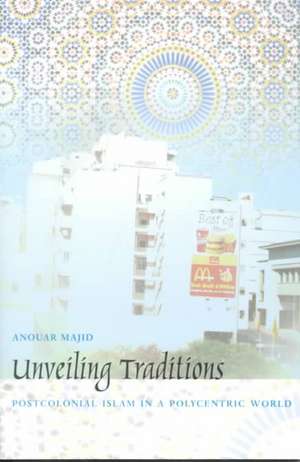Unveiling Traditions – Postcolonial Islam in a Polycentric World
Autor Anouar Majiden Limba Engleză Paperback – 3 apr 2024
Majid moves beyond Edward Said's unmasking of orientalism in the West to examine the intellectual assumptions that have prevented a more nuanced understanding of Islam's legacies. In addition to questioning the pervasive logic that assumes the "naturalness" of European social and political organisations, he argues that it is capitalism that has intensified cultural misunderstanding and created global tensions. Besides examining the resiliency of orientalism, the author critically examines the ideologies of nationalism and colonialist categories that have redefined the identity of Muslims (especially Arabs and Africans) in the modern age and totally remapped their cultural geographies. Majid is aware of the need for Muslims to rethink their own assumptions. Addressing the crisis in Arab-Muslim thought caused by a desire to simultaneously "catch-up" with the West and also preserve Muslim cultural authenticity, he challenges Arab and Muslim intellectuals to imagine a post-capitalist, post-Eurocentric future. Critical of Islamic patriarchal practices and capitalist hegemony, Majid contends that Muslim feminists have come closest to theorising a notion of emancipation that rescues Islam from patriarchal domination and resists Eurocentric prejudices.
Majid's timely appeal for a progressive, multicultural dialogue that would pave the way to a polycentric world will interest students and scholars of postcolonial, cultural, Islamic, and Marxist studies.
Preț: 237.85 lei
Nou
Puncte Express: 357
Preț estimativ în valută:
45.52€ • 47.25$ • 37.95£
45.52€ • 47.25$ • 37.95£
Carte tipărită la comandă
Livrare economică 22 martie-05 aprilie
Preluare comenzi: 021 569.72.76
Specificații
ISBN-13: 9780822326236
ISBN-10: 082232623X
Pagini: 240
Dimensiuni: 152 x 229 x 15 mm
Greutate: 0.33 kg
Ediția:New.
Editura: MD – Duke University Press
ISBN-10: 082232623X
Pagini: 240
Dimensiuni: 152 x 229 x 15 mm
Greutate: 0.33 kg
Ediția:New.
Editura: MD – Duke University Press
Recenzii
"An important book. Coming from a different intellectual perspective, Majid qualifies and expands the ordinary terms of postcolonial discourse and he does so from a genuinely international intellectual position. There are few academics writing today who draw on the cultural and literary range that Majid does here." - Leila N. Ahmed, author of Women and Gender in Islam
"This excellent book is full of passionate, polemical scholarship. Majid covers a wide-ranging territory - the persistence of 'orientalist' discourse, 'Arab' nationalism, 'Islamic fundamentalism,' postcolonial criticism, a critique of capitalism, contemporary Muslim feminist scholarship, and (black) African novels from Islamic cultural backgrounds. This timely book will make a significant contribution to current debates about progressive social, political, and cultural directions." - Abdul JanMohamed, University of California, Berkeley
"An important book. Coming from a different intellectual perspective, Majid qualifies and expands the ordinary terms of postcolonial discourse and he does so from a genuinely international intellectual position. There are few academics writing today who draw on the cultural and literary range that Majid does here." - Leila N. Ahmed, author of Women and Gender in Islam "This excellent book is full of passionate, polemical scholarship. Majid covers a wide-ranging territory - the persistence of 'orientalist' discourse, 'Arab' nationalism, 'Islamic fundamentalism,' postcolonial criticism, a critique of capitalism, contemporary Muslim feminist scholarship, and (black) African novels from Islamic cultural backgrounds. This timely book will make a significant contribution to current debates about progressive social, political, and cultural directions." - Abdul JanMohamed, University of California, Berkeley
"This excellent book is full of passionate, polemical scholarship. Majid covers a wide-ranging territory - the persistence of 'orientalist' discourse, 'Arab' nationalism, 'Islamic fundamentalism,' postcolonial criticism, a critique of capitalism, contemporary Muslim feminist scholarship, and (black) African novels from Islamic cultural backgrounds. This timely book will make a significant contribution to current debates about progressive social, political, and cultural directions." - Abdul JanMohamed, University of California, Berkeley
"An important book. Coming from a different intellectual perspective, Majid qualifies and expands the ordinary terms of postcolonial discourse and he does so from a genuinely international intellectual position. There are few academics writing today who draw on the cultural and literary range that Majid does here." - Leila N. Ahmed, author of Women and Gender in Islam "This excellent book is full of passionate, polemical scholarship. Majid covers a wide-ranging territory - the persistence of 'orientalist' discourse, 'Arab' nationalism, 'Islamic fundamentalism,' postcolonial criticism, a critique of capitalism, contemporary Muslim feminist scholarship, and (black) African novels from Islamic cultural backgrounds. This timely book will make a significant contribution to current debates about progressive social, political, and cultural directions." - Abdul JanMohamed, University of California, Berkeley
Textul de pe ultima copertă
"This excellent book is full of passionate, polemical scholarship. Majid covers a wide-ranging territory--the persistence of 'orientalist' discourse, 'Arab' nationalism, 'Islamic fundamentalism, ' postcolonial criticism, a critique of capitalism, contemporary Muslim feminist scholarship, and (black) African novels from Islamic cultural backgrounds. This timely book will make a significant contribution to current debates about progressive social, political, and cultural directions."-- Abdul JanMohamed, University of California, Berkeley
Cuprins
Preface
> Introduction: Villainies Veiled and Unveiled > 1. Can the Postcolonial Critic Speak? Orientalism and the Rusdie Affair
> 2. Millennium without Arabs?
> 3. The North as Apocalypse
> 4. Women’s Freedom in Muslim Spaces
> Conclusion: Indispensable Polyentricity
Notes
Index
> Introduction: Villainies Veiled and Unveiled > 1. Can the Postcolonial Critic Speak? Orientalism and the Rusdie Affair
> 2. Millennium without Arabs?
> 3. The North as Apocalypse
> 4. Women’s Freedom in Muslim Spaces
> Conclusion: Indispensable Polyentricity
Notes
Index
Descriere
Questions the intellectual assumptions that prevent an understanding of potential Islamic contributions toward a more egalitarian world civilization.
